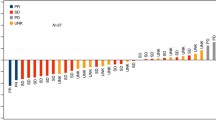Abstract
Regorafenib (Stivarga®), a new inhibitor of multiple kinases, is indicated as third-line treatment in patients with locally advanced, unresectable or metastatic gastrointestinal stromal tumor (GIST) who have been previously treated with imatinib and sunitinib in the USA. In a phase III trial in patients with progressive GIST after failure of standard therapies, regorafenib plus best supportive care increased median progression-free survival by >5-fold relative to best supportive care alone. Although regorafenib is associated with several specific drug-related adverse events, it is reasonably well tolerated if recommendations for dose modifications (i.e. treatment interruption, dose reductions and/or permanent treatment discontinuation based on tolerability) and other precautions are followed.

Similar content being viewed by others
References
American Cancer Society. Detailed guide: gastrointestinal stromal tumor (GIST). http://www.cancer.org/acs/groups/cid/documents/webcontent/003103-pdf.pdf. Accessed 7 Jun 2013.
Lamba G, Gupta R, Lee B, et al. Current management and prognostic features for gastrointestinal stromal tumor (GIST). Exp Hematol Oncol. 2012;1(1):14. doi:10.1186/2162-3619-1-14.
Ganjoo KN, Patel S. Current and emerging pharmacological treatments for gastrointestinal stromal tumour. Drugs. 2011;71(3):321–30.
Aprile G, Macerelli M, Giuliani F. Regorafenib for gastrointestinal malignancies: from preclinical data to clinical results of a novel multi-target inhibitor. Bio Drugs. 2013;27(3):213–24.
Stivarga® (regorafenib) tablets, for oral use: US prescribing information. Wayne (NJ): Bayer Healthcare Pharmaceuticals Inc., 2013.
Wilhelm SM, Dumas J, Adnane L, et al. Regorafenib (BAY 73-4506): a new oral multikinase inhibitor of angiogenic, stromal and oncogenic receptor tyrosine kinases with potent preclinical antitumor activity. Int J Cancer. 2011;129(1):245–55.
Demetri G. Differential properties of current tyrosine kinase inhibitors in gastrointestinal stromal tumors. Semin Oncol. 2011;38(Suppl. 1):S10–9.
George S, Wang Q, Heinrich MC, et al. Efficacy and safety of regorafenib in patients with metastatic and/or unresectable GI stromal tumor after failure of imatinib and sunitinib: a multicenter phase II trial. J Clin Oncol. 2012;30(19):2401–7.
Demetri GD, Reichardt P, Kang YK, et al. Efficacy and safety of regorafenib for advanced gastrointestinal stromal tumours after failure of imatinib and sunitinib (GRID): an international, multicentre, randomised, placebo-controlled, phase 3 trial. Lancet. 2013;381(9863):295–302.
George S, Feng Y, von Mehren M, et al. Prolonged survival and disease control in the academic phase II trial of regorafenib in GIST: response based on genotype [abstract no. 10511]. J Clin Oncol. 2013;31(15 Suppl.).
Demetri GD, Jeffers M, Reichardt P, et al. Mutational analysis of plasma DNA from patients (pts) in the phase III GRID study of regorafenib (REG) versus placebo (PL) in tyrosine kinase inhibitor (TKI)-refractory GIST: correlating genotype with clinical outcomes [abstract no. 10503]. J Clin Oncol. 2013;31(15 Suppl.).
Casali PG, Reichardt P, Kang Y, et al. Clinical benefit with regorafenib across subgroups and post progression in patients with advanced gastrointestinal stromal tumors (GIST) after progression on imatinib (IM) and sunitinib (SU): Phase III GRID trial update [abstract no. 14780]. Ann Oncol. 2012;23(Suppl. 9):i478–9.
Belum VR, Wu S, Lacouture ME. Risk of hand-foot-skin reaction with the novel multikinase inhibitor regorafenib: a meta-analysis. Invest New Drugs. 2013. doi:10.1007/s10637-013-9977-0.
Disclosure
The preparation of this review was not supported by any external funding. During the peer review process, the manufacturer of the agent under review was offered an opportunity to comment on the article. Changes resulting from comments received were made by the author on the basis of scientific and editorial merit.
Author information
Authors and Affiliations
Corresponding author
Additional information
The manuscript was reviewed by: P. Rutkowski, Department of Soft Tissue/Bone Sarcoma and Melanoma, Maria Sklodowska-Curie Memorial Cancer Center and Institute of Oncology, Warsaw, Poland.
Rights and permissions
About this article
Cite this article
Lyseng-Williamson, K.A. Regorafenib: A Guide to Its Use in Advanced Gastrointestinal Stromal Tumor (GIST) After Failure of Imatinib and Sunitinib. BioDrugs 27, 525–531 (2013). https://doi.org/10.1007/s40259-013-0061-2
Published:
Issue Date:
DOI: https://doi.org/10.1007/s40259-013-0061-2




